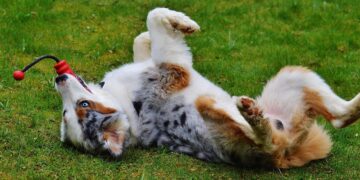Mastering Manners: The Ultimate Guide to Dog Behavior Training
When it comes to owning a dog, one of the most important aspects of their training is teaching them proper manners. Whether you have a new puppy or an older dog, it’s never too late to start training them in the right behaviors. In this comprehensive guide, we will cover everything you need to know about mastering manners in your canine companion.
Understanding Dog Behavior
Before diving into training your dog in proper manners, it’s crucial to understand their behavior. Dogs are social animals that have their own unique ways of communicating with humans and other dogs. By understanding their behavior, you can better address any issues that may arise during training.
Common Dog Behaviors
Some common dog behaviors that you may encounter include barking, jumping, chewing, digging, and aggression. These behaviors can be addressed through proper training techniques and consistency. It’s important to remember that each dog is unique, and what works for one may not work for another.
Basic Manners Training
When it comes to training your dog in basic manners, consistency is key. Start with simple commands such as sit, stay, come, and leave it. Use positive reinforcement techniques such as treats, praise, and toys to reward your dog for good behavior.
Leash Training
Leash training is an important aspect of teaching your dog proper manners. Start by getting your dog used to wearing a collar and leash, then gradually introduce them to walking on a leash. Use treats and praise to reward them for walking calmly beside you.
House Training
House training is another essential part of teaching your dog good manners. Start by establishing a routine for feeding, potty breaks, and playtime. Take your dog outside frequently and reward them for going to the bathroom outside. Consistency is key in house training.
Advanced Manners Training
Once your dog has mastered basic manners, you can move on to more advanced training techniques. This may include teaching them tricks, agility training, or advanced obedience commands. Remember to always use positive reinforcement and be patient with your dog.
Socialization
Socialization is an important aspect of training your dog in good manners. Expose them to different people, animals, and environments to help them become well-rounded and well-behaved. Socialization can also help prevent behavior issues such as aggression and fearfulness.
Behavior Modification
If your dog is exhibiting unwanted behaviors such as aggression or anxiety, behavior modification techniques can help address these issues. Consult with a professional trainer or behaviorist for guidance on how to modify your dog’s behavior effectively.
Common Questions About Dog Behavior Training
How long does it take to train a dog in good manners?
The time it takes to train a dog in good manners varies depending on the dog’s age, breed, and previous training. Consistency and patience are key factors in successful training.
What is the best way to address barking in dogs?
Barking is a common behavior in dogs that can be addressed through training techniques such as desensitization, redirection, and positive reinforcement. Identify the root cause of your dog’s barking and address it accordingly.
Is it possible to train an older dog in good manners?
Yes, it is possible to train an older dog in good manners. While it may take more time and patience, older dogs can still learn new behaviors and adapt to training techniques.
Conclusion
Training your dog in good manners is a rewarding and fulfilling experience that can strengthen the bond between you and your furry friend. By understanding their behavior, using positive reinforcement techniques, and being consistent in your training, you can help your dog become a well-behaved and well-adjusted companion. Remember that each dog is unique, and what works for one may not work for another. Consult with a professional trainer or behaviorist if you encounter any challenges during training. With time and patience, your dog can master manners and become a well-behaved member of your family.














































